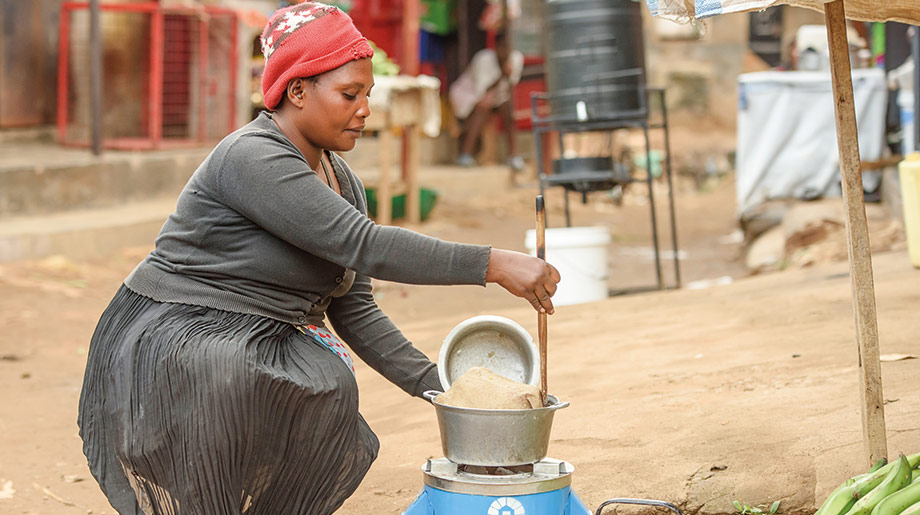Efficient Cook Stoves reduce Emissions in Uganda

Type de projet: Fours efficaces
Site du projet: Uganda
Statut de projet: In corso, certificati disponibili
Réduction annuelle des émissions de l'ensemble du projet: 119,845 t CO2
This climate protection project reduces greenhouse gas emissions and deforestation in Uganda by disseminating efficient cook stoves that have been proven through testing to be more efficient than traditional models such as three stone open fire or traditional charcoal stoves. People benefit from lesser indoor air pollutants and save time or money using less fuelwood for cooking.
More than 80 per cent of Uganda's rural households use firewood for cooking. The high demand for wood fuel and limited access to energy savings alternative means that forest cover is at risk of continued degradation. According to the World Bank the rate of forest cover loss in Uganda stands at 2.6 per cent annually, one of the highest in the world. It means that every year, 2.6 per cent of the country’s forests are cut down for fuel, agriculture, and to make way for population growth. If things stay as they are, Uganda will lose all its forest cover in less than 25 years according to the country’s National Environment Management Authority.
Therefore, improved biomass cookstoves are built and disseminated which reduce wood and or charcoal consumption and indoor air pollutants from incomplete combustion. These improved cook stoves improve heat transfer efficiency as compared to the baseline conventional stoves, thereby reducing both the amount of fuel used and greenhouse gas emissions from the burning of non-renewable woody biomass and/or charcoal. The project distributes efficient cook stoves to both residential and commercial users.
The stove is strong and doesn’t easily break like the ordinary cookstoves. I strongly believe that it will serve my family for many years.
The project activities significantly reduce greenhouse gas emissions while simultaneously offering co-benefits to families such as relief from high fuel costs and/or improved health. Specifically these new kitchen regimes will provide some or all of the following benefits: Reduce unsustainable wood harvest and the accompanying deforestation; diminish the charcoal and fuel wood bill for households and schools and save fuel collection time for other important activities; contribute to the preservation of wood resources so as to avoid inter-communal conflict over resources
I have been using the stove for the past two months and it has made a big difference by cutting my charcoal expenditure in half.
The programme is promoting the sale of these improved energy-saving biomass stoves, selling different models such as charcoal fuelled stoves and wood fuelled stoves. The project works through local and international organisations as well as local and imported stove distributors to reach Uganda with more efficient cooking technologies. The project sells these stoves, investing revenues from carbon finance in subsidies, social marketing, and the development of robust distribution channels. Since 2018, for a new crediting period, the revenue from the carbon credits would go towards the research and development for developing newer stoves that will put the gap between the supply (manufacturers) and demand (end-users) at ease through the entire region of Uganda.
How do the employees ensure high quality of stoves and processes?
Babra Naigaga (see pictures), an employee of the projects, allows customers to select the stove of their choice. She then registers the customer in the programmes digital app, captures the serial number through a photo and issues the customer a written receipt. Sylvia Nakyuka and Nyero Anthony (see picture) receive the stoves for stocking. They carefully follow quality control procedures and ensure there were no damages during transportation.
This project contributes to 8 SDGs (as of end 2022):
Find out how myclimate reports these SDGs in our FAQ.
The following SDGs are verified by the Gold Standard:
35 000 households report less smoke since using of improved stove.
35 000 efficient stoves have been installed since project start.
Each stove avoids 4.6 tonnes of CO2 per year.
Ces ODD ont été approuvés par myclimate:
Diminish fuel wood bill for households and commercial users and save fuel collection time for other activities.
Employees trained on operation of the efficient cook stove.
The project employs a direct sales team that sells stoves throughout the country.
Each stove reduces firewood consumption.
Reduce unsustainable wood harvest and the accompanying deforestation.
Situation sans projet
Higher consumption of non renewable biomass and charcoalDocumentations
Standard de projet

Numéro de projet
7245











